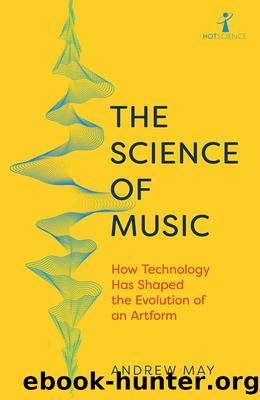The Science of Music by Andrew May

Author:Andrew May
Language: eng
Format: epub
Publisher: Icon Books
Published: 2023-02-15T00:00:00+00:00
An illustration of Maelzelâs panharmonicon, a kind of self-contained mechanical orchestra.
Unknown author, public domain, via Wikimedia Commons
As for âelectric instrumentsâ, the first viable one dates from 1759. Iâll pause a second to let that sink in: not 1959, or even 1859, but 1759 â the year George Frederick Handel died. It was called the clavecin électrique, and it used a standard musical keyboard to operate a series of tuned bells by altering their static electric charge. The first âsound synthesiserâ followed around a century later â not as a musical instrument, but a scientific one. Designed by the physicist Hermann Helmholtz, it used electromagnets to vibrate an array of tuning forks of different sizes. Because the sound produced by a tuning fork is close to a pure sine wave, Helmholtz was able to use his device to recreate more complex sounds made up of a number of partials. This reverses the process of Fourier analysis described in Chapter 2, and â as weâll see shortly â is an example of what in todayâs jargon is called âadditive synthesisâ.
Actually, I was playing with words a little in the previous paragraph. Thereâs a difference between the adjective âelectricâ, which simply means powered by electricity, and âelectronicâ, which relates to electrons â subatomic particles that werenât even discovered until the final years of the 19th century. While the clavecin électrique and the Helmholtz synthesiser are electric, theyâre not electronic â and itâs only with electronics that really sophisticated technology becomes possible. Itâs worth taking a step back at this point to see just why thatâs the case.
Download
This site does not store any files on its server. We only index and link to content provided by other sites. Please contact the content providers to delete copyright contents if any and email us, we'll remove relevant links or contents immediately.
| Biographies | Business |
| History & Criticism | Instruments |
| Musical Genres | Recording & Sound |
| Reference | Songbooks |
| Theory, Composition & Performance |
The Goal (Off-Campus #4) by Elle Kennedy(13651)
Kathy Andrews Collection by Kathy Andrews(11810)
Diary of a Player by Brad Paisley(7557)
Assassin’s Fate by Robin Hobb(6197)
What Does This Button Do? by Bruce Dickinson(6194)
Big Little Lies by Liane Moriarty(5790)
Altered Sensations by David Pantalony(5092)
Pale Blue Dot by Carl Sagan(4995)
Sticky Fingers by Joe Hagan(4188)
The Death of the Heart by Elizabeth Bowen(3605)
The Heroin Diaries by Nikki Sixx(3543)
Beneath These Shadows by Meghan March(3298)
Confessions of a Video Vixen by Karrine Steffans(3296)
How Music Works by David Byrne(3257)
The Help by Kathryn Stockett(3139)
Jam by Jam (epub)(3071)
Harry Potter 4 - Harry Potter and The Goblet of Fire by J.K.Rowling(3057)
Computational Linguistics and Intelligent Text Processing: 20th International Conference, CICLing 2019 La Rochelle, France, April 7â13, 2019 Revised Selected Papers, Part I by Alexander Gelbukh(2978)
Strange Fascination: David Bowie: The Definitive Story by David Buckley(2856)
